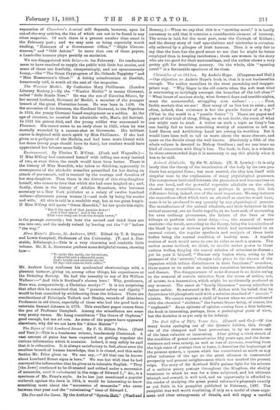Animal Alkaloids. By Sir W. Aitken. (H. K. Lewis.)—It is
only lately that the theory of the intoxication of the body by its own pro- ducts has acquired fame ; but once started, the idea lent itself with singular ease to the explanation of many physiological processes. The comparison instituted between the ptomaines and leucomaines on the one hand, and the powerful vegetable alkaloids on the other, showed many resemblances, except perhaps in power, this last difference being, indeed, one of the most important. We may instance the marvellous effect which such an alkaloid as nicotine would have, were it to be produced in any quantity by any physiological process. The manufacture of the animal alkaloids, and their behaviour in the animal economy, are no doubt capable, as we have said, of accounting for even ordinary phenomena, the failure of the liver or the kidneys to perform their usual daty,—i.e., the removal of waste matters—the result, according to the theory, being the intoxication of the blood by one or various poisons which had accumulated to an unusual extent, the regular synthesis and analysis of these toxic bodies being the normal condition of healthy man. A regular routine of work would seem to owe its value to such a system. The author seems inclined, we think, to ascribe undue power to these carious bodies, denying the causal relation of microbes to disease ; yet he pats it himself, "Disease only begins when, owing to the presence of the microbe,' changes take place in the tissues of the organism which induce disturbances in their functions ;" somehow, there seems to be rather an intimate connection between microbes and disease. The disappearance of some diseases is no doubt owing to the removal of certain microbes from the scene of action, not, of course, to a let:corneae, which might be accidentally produced at any moment. The sneer at "family likenesses" among microbes is rather unfair. So saturated is Sir W. Aitken with his belief, that he determines his phosphoric acid with a solution standard of " uroarnic " nitiate. We cannot repress a thrill of horror when we are confronted with the chemical "skeleton," the human frame being, of coarse, the "cupboard." As an epitome of opinion coming from a firm believer, the book is interesting, perhaps, from a pathological point of view, bat the doctrine is as yet only in its infancy.


































 Previous page
Previous page